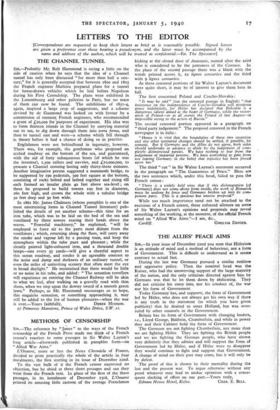METHODS OF CENSORSHIP
Sm,—Thz reference by " Janus " to the ways of the French censorship of the French Press made me think of a French censor's reaction to some passages in Sir Walter Layton's long article—afterwards published in pamphlet form—on " Allied War Aims."
L'Oeuvre, more or less the News Chronicle of France, decided to print practically the whole of the article in four instalments, the first starting in its issue of December 22nd.
To the vast bulk of it the French censor expressed no objection, but he shied at three short passages and out they went from the French text. In place of the first of the three passages, in its instalment of December 23rd, L'Oeuvre printed its amusing little cartoon of the average Frenchman kicking at the closed door of Anastasie, named after the saint who is considered to be the patroness of the Censure. In the place of the second passage there was a blank with the words printed across it, to lignes censurees and the third with 9 lignes censurees.
As these censored portions of Sir Walter Layton's document were quite short, it may be of interest to give them here in full.
The first concerned Poland and Czecho-Slovakia :
"II may be said" (ran the censored passage in English) " that insistence on the independence of Czecho-Slovakia will postpone peace indefinitely, for Hitler has declared that Bohemia is a dangerous salient aimed at the heart of Germany, while the restor- ation of Poland—or at all events the Poland of last August—is impossible owing to the action of Russia."
The second censored portion appeared in a paragraph on " third party judgement." The proposal censored in the French newspaper is in italic:
" Hence it is vital that the boundaries of these two countries and any other territorial changes should be settled, if possible, by consent. But if Germany and the Allies do not agree, both sides should undertake in advance to abide by the judgement of com- pletely disinterested parties. We have nothing to fear from the judgement of impartial persons. We have everything to gain from not leaving Germany in the belief that injustice has been forced upon her."
The third " cut " in Sir Walter Layton's statement occurred in the paragraph on " The Guarantees of Peace." Here are the two sentences which, under this head, failed to pass the French censor: " There is a widely held view that if this disintegration [of Germany] does not come about from inside, the work of Bismarck must be undone by force and Germany 4oken up into its com- ponent parts. This is a specious but unwise proposal."
While too much importance need not be attached to the excisions of a French censor, these enforced silences on some of Sir Walter Layton's opinions and proposals may reveal something of the working, at the moment, of the official French mind on " Allied War Aims."—I am, &c.,


































 Previous page
Previous page